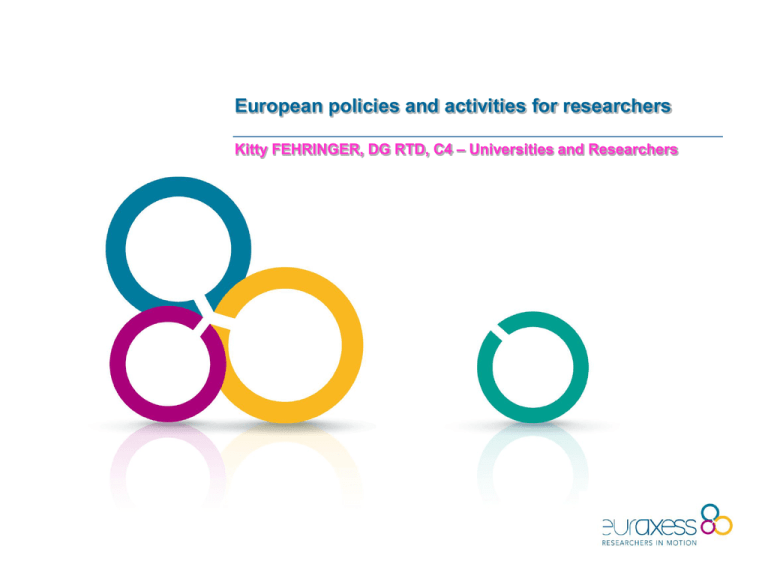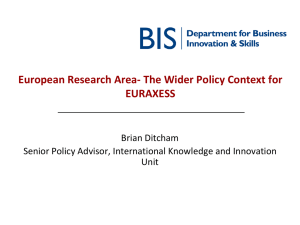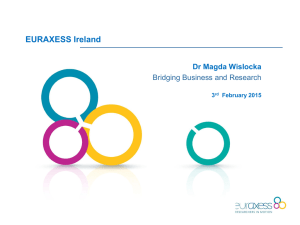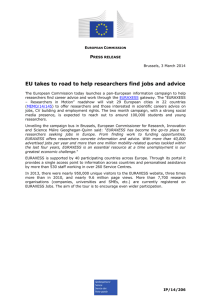A. The European Research Area (ERA)
advertisement

European policies and activities for researchers Kitty FEHRINGER, DG RTD, C4 – Universities and Researchers ERA doors wide open to WBC (Commissioner Potočnik, Vienna, 26 June 2006) 3 pillars: (1) Engage together in research cooperation: association to FP7 (2) How improve research capacity: a) Human capital b) Infrastructure (3) Create synergies with other instruments & stakeholders (…) Pillar 2: the Human Capital – Outline presentation A. Policy frame – Researchers in the European Research Area (ERA): the evolution B. Actions undertaken and results obtained so far C. Results - Focus on: EURAXESS – Researchers in Motion A. The European Research Area (ERA): what is it? In 2000, the EU decided to create the European Research Area (ERA). This means creating a unified area all across Europe, in which we should: ◦ Enable researchers to move and interact seamlessly, benefit from world-class infrastructures and work with excellent networks of research institutions; ◦ Share, teach, value and use knowledge effectively for social, business and policy purposes; ◦ Optimise and open European, national and regional research programmes in order to support the best research throughout Europe and coordinate these programmes to address major challenges together; ◦ Develop strong links with partners around the world so that Europe benefits from the worldwide progress of knowledge, contributes to global development and takes a leading role in international initiatives to solve global issues Why researchers in the ERA Challenges Researchers are at the heart of knowledge creation, transfer and exploitation: they are knowledge vectors. Without them, no research. Europe’s challenges on human resources in research: 1) ◦ ◦ ◦ 2) To get more and better trained researchers and to be attractive to the best minds world-wide: Against strong and rising competition, globally and with other economic sectors; Against the imminent retirement of a significant part of Europe’s research workforce; In the light of Europe’s ambitions for higher investments in R&D To mainstream mobility, based on the paradigm of “brain circulation”, across/outside Europe, to maximise knowledge sharing and at the same time benefit from European career perspectives Researchers in the ERA Goals Researchers in Europe need to be provided with a single open, transparent and competitive labour market through actions stimulating: 1. Greater mobility of researchers in Europe - Circulation freedom for researchers, technologies and knowledge (the 5th freedom) 2. Introduction of a European dimension into research careers 3. Europe’s attractiveness to researchers from all over the world - Internationally open and competitive - Facing globalisation Researchers in the ERA The European Partnership for Researchers ◦ Decisive measures are needed for Europe’s researchers, and progress should be made in a comprehensive and coordinated way ◦ Partnership = framework for MS to direct their efforts at national level (National Action Plans) based on common, agreed objectives in 4 key areas: 1. Systematically open recruitment (specific ref. to EURAXESS Jobs and Services); Meet social security and supplementary pension needs of mobile researchers; Provide attractive employment and working conditions; Enhance the training, skills and experience of researchers 2. 3. 4. Pillar 2: the Human Capital – Outline presentation A. Policy frame – Researchers in the European Research Area (ERA): the evolution B. Actions undertaken and results obtained so far C. Results - Focus on: EURAXESS – Researchers in Motion B. Researchers in the ERA: Actions and progress so far ◦ EURAXESS – Researchers in Motion: 4 initiatives that, by supporting the mobility and career of researchers, assist in establishing Europe as an area of excellence in scientific research ◦ Conception and adoption of the European Charter for Researchers and the Code of Conduct for their Recruitment ◦ Development, adoption and implementation of the ‘Scientific visa’ package for third country nationals ◦ 7PQ € 4,75 Bn ‘People’ programme ◦ 7PQ € 7 Bn ‘Ideas’ programme implemented by the European Research Council (ERC) Researchers in the ERA: Actions and progress so far – 1) Mobility issues ◦ Improved information and practical assistance (the EURAXESS Portal and the EURAXESS Services Network) ◦ Favourable conditions for mobility in national research policy and programming in several MS ◦ Much better understanding on issues and some regulatory advancements ◦ Practical recommendations to stakeholders on inter-sectoral mobility ◦ Design and first steps towards integrated data system on career paths and mobility flows of researchers Researchers in the ERA: Actions and progress so far 2) European dimension in research careers ◦ Issuing and start of implementation European Charter for Researchers and Code of Conduct for their Recruitment ◦ Majority of MS has taken some measures on opening up of national research systems ◦ Initiatives to raise visibility and status of the profession of researchers (e.g. « Researchers in Europe Initiative 2005 », the « Nights ») ◦ Statistical projects to generate important trans-nationally coordinated data Researchers in the ERA: Actions and progress so far – 3) Making Europe more attractive ◦ Development, adoption and implementation of the « scientific visa » package* ◦ EURAXESS Links to network European researchers in the US (and, soon, Japan) ◦ Inventory of post-doc schemes in Europe to better understand the European offer and its attractiveness ◦ Strengthened « international dimension » of FP7 «Marie Curie Actions » * Up to January 2009 twenty-three out of the twenty-five concerned Member States had notified what they identified to be measures fully transposing the Directive: Austria, Belgium, Bulgaria, Czech Republic, Estonia, Finland, France, Germany, Greece, Hungary, Ireland, Italy, Latvia, Lithuania, Luxembourg, Malta, Poland, Portugal, Romania, Slovenia, Slovakia, Sweden, and The Netherlands. In Cyprus and Spain relevant law has been adopted, however notification procedures are under finalisation. Denmark and the United Kingdom are not bound by this Directive. Pillar 2: the Human Capital – Outline presentation A. Policy frame – Researchers in the European Research Area (ERA): the evolution B. Actions undertaken and results obtained so far C. Results - Focus on: EURAXESS – Researchers in Motion 24 June 2008: Launch of the new brand EURAXESS – Researcher in Motion C. EURAXESS – Researchers in Motion Recruitment tool with job opportunities, funding opportunities, grants, employment, etc. Relocation assistance for researchers and their family Information on the Charter and Code A networking tool for researchers outside Europe EURAXESS Jobs (http://ec.europa.eu/euraxess/jobs) 31 national EURAXESS Portals – The WBC EURAXESS Services (http://ec.europa.eu/euraxess/services) The WBC active participation EURAXESS Rights (http://ec.europa.eu/euraxess/rights) EURAXESS Links (http://ec.europa.eu/euraxess/links) EURAXESS-Croatia Contract for the start-up funding signed in 2008 - Active participation in EURAXESS activities - Highly committed team - Excellent results (EURAXESS Croatia national portal) EURAXESS-Croatia EURAXESS Conference, 16 – 18 March 2009 Potsdam, Germany EURAXESS and the WBC: what’s next Enlargement of the EURAXESS Services Network: - BiH - Montenegro - Albania Joining EURAXESS = - Advantages for researchers - Advantages for research organisations FP7 2007 –2013 Specific Programmes Cooperation – Collaborative research Ideas – Frontier Research People – Marie Curie Actions Capacities – Research Capacity + JRC (non-nuclear) JRC (nuclear) Euratom FP7 (2007-2013) “People” Specific Programme - Marie Curie Actions Initial training Initial Training Networks* Life-long training and career development Intra-European Fellowships / European Reintegration Grants Co-funding of regional/national/international programmes Industry dimension Industry-Academia Partnerships and Pathways* International dimension Outgoing & Incoming* International Fellowships; International Cooperation Scheme; International Reintegration grants; Support to researcher ‘diasporas’* Specific actions Mobility and career enhancement actions; Excellence awards * Open to third-country nationals FP7 – The People Programme To know more about European policies & initiatives for researchers: http://ec.europa.eu/euraxess To know more about the Marie Curie Actions (FP7/PEOPLE): http://ec.europa.eu/research/mariecurieactions/ Good luck !



